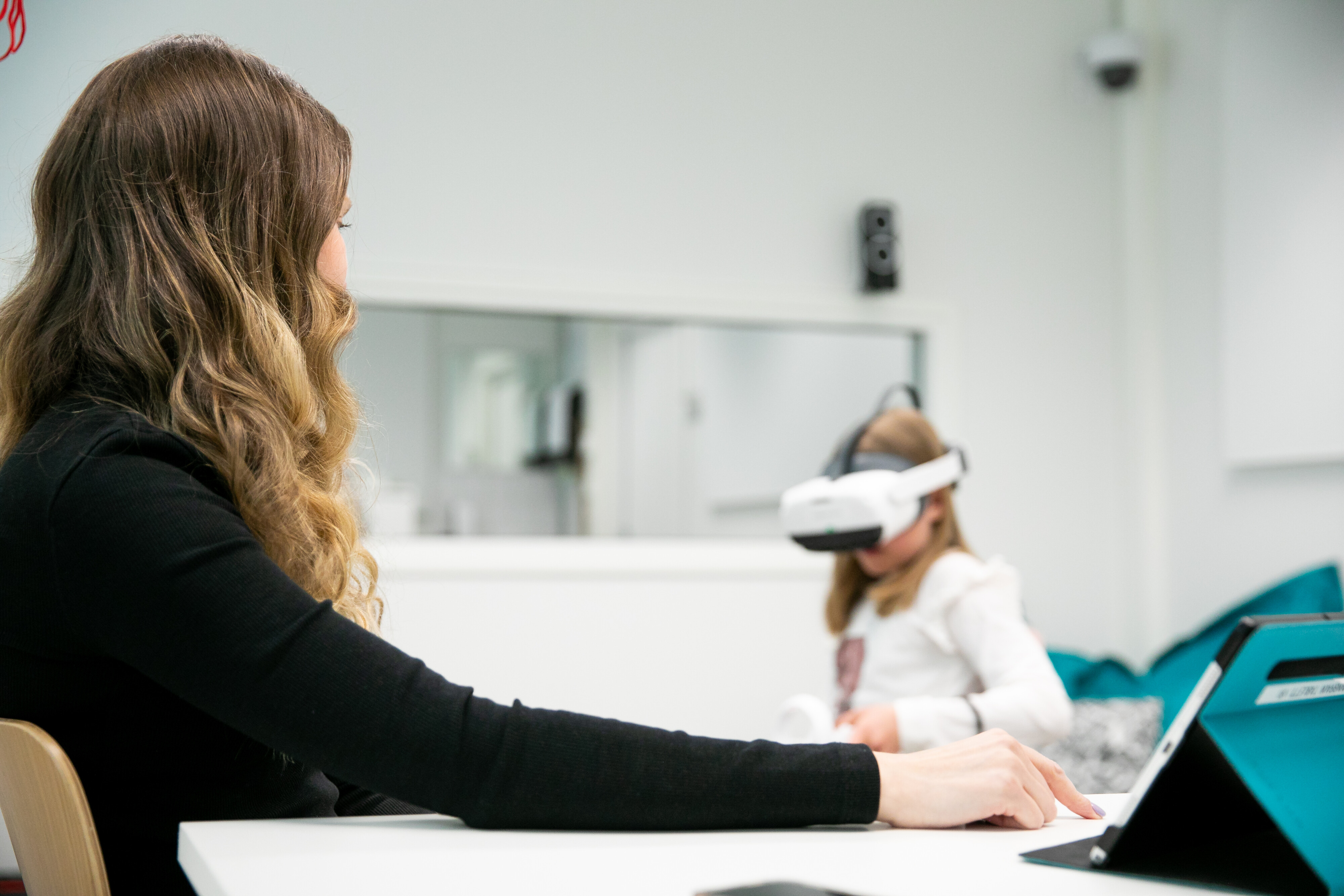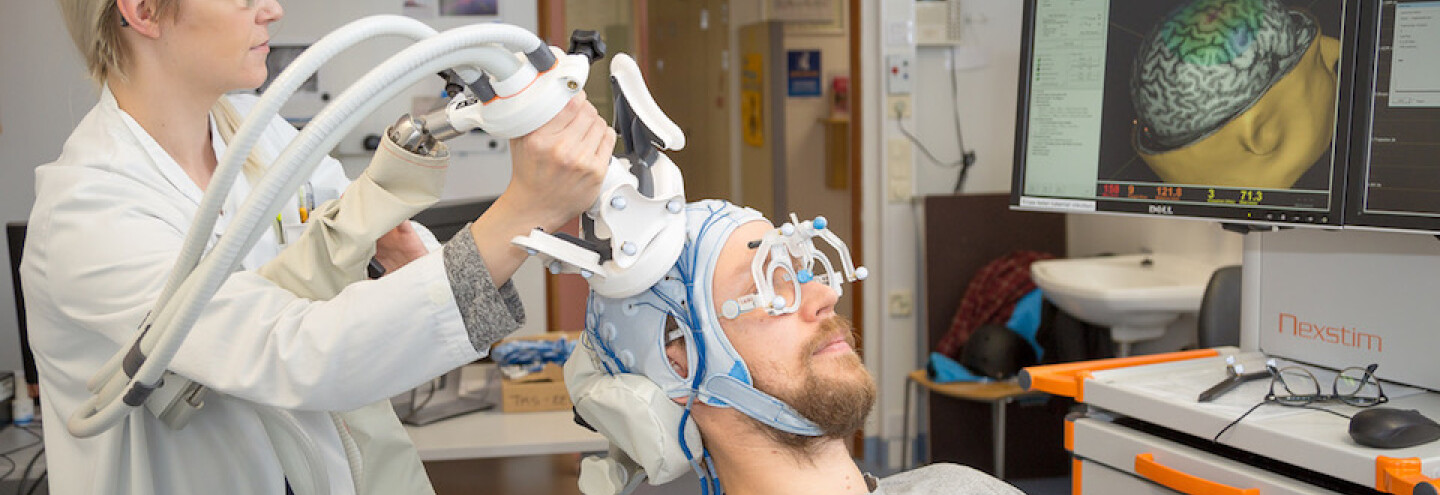Master's Degree Programme in Human Neuroscience
What makes an individual? Learn about the nuances of the most complex organ: the human brain. We educate future experts to understand and measure human brain function and performance throughout the lifespan.
Do you have the brain and mind for human neuroscience?
Watch the webinar recording from UTU Virtual Open Week 2025!
Students of the programme will get a deep understanding of human brain function. They will learn non-invasive imaging methods to investigate brain activation and structure as well as behavioural methods to measure human cognition and performance. The programme gives a strong foundation to work as a human neuroscience expert in various industries requiring knowledge and skills to tackle the complex brain-behaviour issues.
Graduates are expected to find jobs, for example, in companies developing novel health and game products, and in customised marketing research. The programme also gives a strong basis to continue studies towards a PhD.

Entry requirements
Degree requirements
You are an eligible applicant for Master’s-level studies if
- you have a nationally recognized first cycle degree – normally a Bachelor’s degree – from an accredited institution of higher education,
- your degree corresponds to at least 180 ECTS (European credits) or to three years of full-time study,
- your degree gives eligibility to master level studies in the country where it was issued. Your degree is in a relevant field for the Master’s degree programme that you’re applying to. Please check the section on programme-specific admission requirements for detailed degree requirements.
Please see in more detail: https://www.utu.fi/apply
Language Requirements
Applicants must have excellent English language skills and a certificate that proves those skills. You can indicate your language skills by taking one of the internationally recognized English language tests.
Applicants must reach the minimum required test results to be considered eligible to the University of Turku. No exceptions will be made. Read more about the language requirements.
Study right
Please note that it is not possible to have more than one Bachelor’s or Master’s study right at the same Faculty. Therefore, when accepting an offered study place, the student will lose any previous BSc. or MSc. study right at the Faculty of Medicine at the University of Turku.
Before you start preparing your application, always read the full admission requirements on the application portal Studyinfo.fi
Programme specific degree requirements
In addition to general degree requirements, the Master's degree programme in Human Neuroscience has programme-specific degree requirements. The degree the applicant is using as the basis of eligibility must be in a relevant field of study:
psychology, neuroscience, cognitive science
medical sciences, biomedicine, biochemistry
life sciences, biology, physics
computer science, mathematics, statistics
engineering
Degrees in other fields may also provide a suitable background depending on the applicant’s study history and plans.
You should also include a motivation letter that describe the following:
- Your plans and goals; why Master’s Degree Programme in Human Neuroscience?
- The relevance of your study history including previous studies in the field of neuroscience.
- Knowledge and studies in statistics and/or programming.
- English skills; scientific writing.
Motivation letter should be less than 2000 characters (including spaces) long. Please note that the motivation letter may be checked for plagiarism.
The applications are evaluated by the admission committee of the Master’s Degree Programme. The evaluation is based on
- suitability of background studies
- previous academic success
- motivation letter
For the exact scoring, please see the full admission requirements at Studyinfo.fi.
The academic evaluation is made only for complete applications that are received during the application period. Any preliminary assessment of suitability or chances for admission will not be given.
Programme in brief
The extent of the Master’s Degree Programme is 120 ECTS to be completed in two years. The studies consist of:
Brain Imaging Methods (15 ECTS)
Clinical Neuroscience (23 ECTS),
Behavioral Methods to measure human cognition, perception, consciousness and performance (10 ECTS),
Data Analysis (10 ECTS),
Elective Courses (17 ECTS) and Human Neuroscience Seminars, consisting of seminars related to lab presentations, thesis and future career opportunities.
The Master’s thesis will be 40 ECTS. All programme parts contain lectures, group work, independent studies and practical exercises. See the curriculum.
The University of Turku fosters students' professional growth and global perspective by promoting internships and student exchanges. Every degree student can take advantage of these opportunities – all internships come with a guaranteed subsidy, and every exchange programme includes a grant.
Does this page answer your questions about the programme's content and academic matters? If not, contact med-mdp@utu.fi.
University of Turku (est. 1640) is among the top one percent of all universities in the world. Turku is well known particularly for its PET Centre which provides several state-of-art PET and MRI scanners for human studies. With a long research tradition in neuroscience, strong research groups and excellent facilities, Turku is a great place to study neuroscience. Turku has a unique, compact campus area with two universities, a university hospital and a strong cluster of medical and technology companies nearby, which creates an inspiring environment to study and work.
The programme is run by the Turku Brain and Mind Center (TBMC) in collaboration with experts from three faculties (Faculty of Medicine, Faculty of Social Sciences, and Faculty of Technology). TBMC provides a multidisciplinary context for comprehensive theoretical and practical education in human neurosciences. University of Turku has excellent research facilities for non-invasive brain imaging including PET, MRI, fMRI, EEG, TMS, and optical imaging. Researchers of TMBC have a wide network of connections within the Turku area, in Finland and internationally. This provides the students sample opportunities to work and learn in practical research projects.
Master’s thesis (40 ECTS) is an important part of the Programme’s curriculum. Students will write a research plan, participate in a research seminar, conduct practical research work and write a theoretical report of their results. The thesis will be based on analyses of behavioural and/or brain-imaging data conducted in collaboration with research groups or companies in the Turku area or elsewhere.
Examples of Master's thesis topics in MDP in Human Neuroscience:
-
Structural Abnormalities in Gambling Disorder Using Voxel-Based Morphometry
-
An Eye for AI: A Multimodal Bottleneck Transformer Approach for Predicting Individual Eye Movements : Towards Foundation Models for Human Factors & Neuroscience
-
The Relationship Between Personality and the Perception of the Ambiguous Necker Cube Stimuli
-
Predicting Speech Disfluency in Five-Year-Olds using Gray Matter Volume
Career prospects
In the Master’s Degree Programme you will
- learn to understand and measure complex brain functions at systems level
- learn to measure human cognition, perception and behaviour
- learn to integrate brain-level and behavioural measurements to investigate human performance in different contexts
- gain knowledge and skills suitable for pursuing a scientific career
- design and manage your research project
- analyse behavioural and imaging data
- work in international and interdisciplinary research groups
The interdisciplinary Master’s Degree Programme in Human Neuroscience provides you with broad knowledge to use behavioural methods, non-invasive brain imaging and structural brain measures as indices of the complex brain–behaviour relationship in different settings.
The Programme gives a strong basis to pursue a career as a human neuroscience expert. For example, graduates of the Programme can
- work in medical companies
- work in health and game industries
- continue studies and research towards a PhD
Master of Science degree provides you with eligibility for PhD studies. Graduates from the Programme are eligible to apply for a position in the University of Turku Graduate School, UTUGS. The Graduate School consists of doctoral programmes, which cover all disciplines and doctoral candidates of the University.




